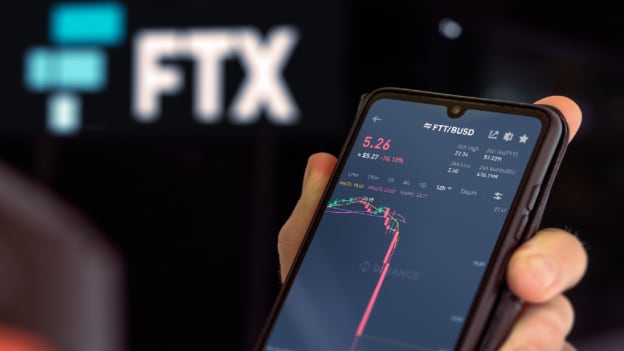Why crypto world in rude shock over the FTX collapse

The crypto winter looks numbing, and the FTX fall is biting the market hard.
The meteoric rise and dramatic fall of cryptocurrency major FTX anchored by the charismatic Sam Bankman-Fried underline the hazards of the volatile crypto market that keeps teetering on the edge.
The collapse of the proposed FTX-Binance deal meant a sharp fall in the price of bitcoin and the crash of Luna.
This year has been a tad difficult for cryptocurrency investors across the world. Further, the crash of the cryptocurrency exchange FTX has added to the pain of the crypto market, disrupting the recovery it was making over the last few months.
The 25 million-strong Indian crypto investors are not immune to the fallout. According to industry estimates, around 5 lakh investors, who own FTX’s native token FTT, have been directly affected by the crash.
FTX was the second-largest, centralised crypto exchange in the world until a few days ago.
It took just two years for the 30-year-old entrepreneur to build FTX into a $32 billion company. Besides spending hundreds of millions of dollars to resuscitate struggling crypto firms, his quick rise also saw him become a major political donor to Joseph R. Biden Jr.’s presidential campaign.
Suddenly, Sam Bankman-Fried needed a bailout for his struggling firm.
The owner of Binance and arch-rival Changpeng Zhao announced to bail out FTX o Twitter on November 8, just 48 hours before he backtracked. Binance pulled out of the proposed deal, sending the crypto market into a tailspin on November 10.
The value of the overall crypto sector dropped 12% over a day to $911 billion, according to CoinMarketCap. JPMorgan strategists say the FTX debacle could spell disaster for the industry.
FTX’s future grew murkier after the deal fell through. Without much explanation, the company said in a statement that its executives changed their minds because of regulatory concerns and issues with “corporate due diligence.”
FTX has filed for bankruptcy. With marquee investors like Sequoia, Softbank, and Temasek, the crypto exchange quickly rose and became the second-largest exchange in the world. The firm’s fortunes suddenly came crashing down after it could not gather enough cash to return its users’ funds.
During his prime, Sam Bankman-Fried, whose net worth was once estimated at $26 billion, considered buying out behemoths like Goldman Sachs and the CME Group.
What does FTX do?
Its only job was to connect buyers with sellers and collect commissions on the transactions. Users would deposit fiat money (US dollars or other government-issued currencies) into their FTX account and then use the money to buy and sell crypto. After the poor financial status of FTX became public, the exchange saw frantic withdrawals by users.
Usually, banks run into trouble when a large number of depositors withdraw money at once, since banks lend money out but don’t have the deposit money with them. But FTX was only a middleman, and being unable to process all withdrawals was a dead giveaway of a serious financial issue. Even when an exchange lends money to users who wish to make leveraged trades, it has mechanisms in place to ensure that it can recover the money.
How did the crypto exchange problems begin?
Bankman-Fried founded Alameda Research, a proprietary trading firm that traded in cryptocurrency first. Later, he founded FTX, which quickly made a mark. After Alameda Research faced losses in its business, funds were transferred from FTX to Alameda – and these funds included customer fiat money deposits and FTT tokens. As a result, nearly a third of Alameda’s assets, worth $ 14.6 billion, was held in FTT tokens.
Alameda’s balance sheet was leaked on Coinbase, which caused concern amongst users and investors. According to its balance sheet, Alameda had used its assets to borrow for its business operations and had around $7.4 billion in debt. There is speculation that its FTT tokens were collateral for the loans it took. A collapse in the value of the collateral (FTT tokens) would have sent the entire group into a tailspin. Hence, the value of FTT tokens gained immense importance for the FTX group.
The Crypto business goes into a tailspin
There may be trouble brewing for individual investors, the venture capital community, backers, and even other crypto businesses.
“There are going to be big victims here,” believes Nic Carter, co-founder, and chairman of Coin Metrics.
“There will be a lot of innocent victims, not just individuals but also other firms like fintech firms, crypto firms that were providing access to end users,” Carter told Fortune.
What can make the matter worse is that cryptocurrency and related business entities aren’t regulated in the U.S. the way other financial institutions like banks or credit unions are.
That means there’s no guarantee that customer assets are safe right now.
First, he tweeted that FTX client assets were fine, but quietly deleted that claim two days later.
There is little regulation in the crypto industry, which makes it difficult for federal agencies like the Securities and Exchange Commission or the Commodity Futures Trading Commission to get involved.
Anxiety grows among retail investors
Though Bankman-Fried tried to allay the fears of customers by saying they should be able to fully withdraw their funds, they are not convinced. They have already pulled out more than $6 billion from the exchange. International customers have seen withdrawals paused this week, though the team has said it’s working through the backlog of requests.
For the time being, anxious customers have little choice other than to keep their fingers crossed.
















